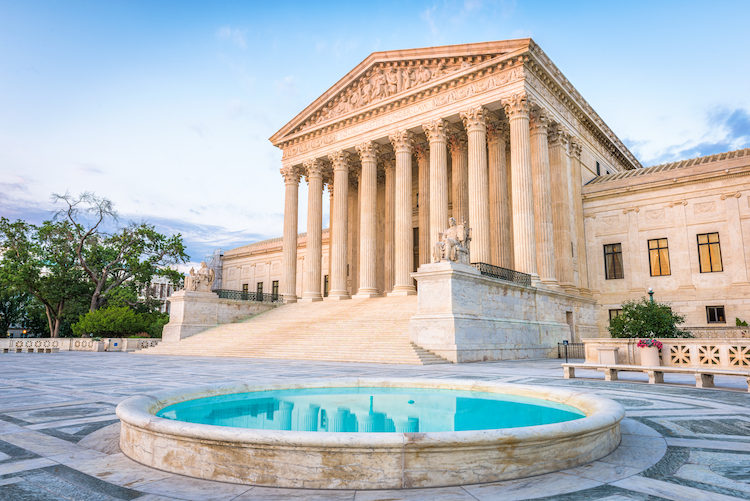SCOTUS Fails to Identify Leaker of Dobbs Opinion

The U.S. Supreme Court has failed to discover who leaked a draft of the Court’s opinion in Dobbs v. Jackson Women’s Health Organization, which overturned Roe v. Wade. According to the Court’s investigatory report, the Court “has to date been unable to identify a person responsible by a preponderance of the evidence.”
Supreme Court Leak Investigation
The months-long investigation, which was conducted by the Marshal of the Supreme Court, involved forensic analysis and interviews of nearly 100 people. According to the Court’s 20-page report, it “is unlikely that the Court’s information technology (IT) systems were improperly accessed by a person outside the Court.” Nonetheless, the report acknowledges that “[t]he pandemic and resulting expansion of the ability to work from home, as well as gaps in the Court’s security policies, created an environment where it was too easy to remove sensitive information from the building and the Court’s IT networks, increasing the risk of both deliberate and accidental disclosures of Court-sensitive information.”
According to the report, all of the Court employees interviewed affirmed under penalty of perjury that they did not disclose the Dobbs draft opinion to any person not employed by the Supreme Court. Some did, however, admit to telling their spouses about the draft opinion or vote count.
Based on its findings, the report outlines several recommendations aimed to deter another breach. Notably, the investigation confirmed that too many people had access to highly sensitive information, such as draft options, and the Court lacked the ability to actively track who is handling and accessing these documents. “Distribution should be more tailored and the use of hard copies for sensitive documents should be minimized and tightly controlled,” the report states.
The Supreme Court’s leak report also highlights the lack of any universal written policy or guidance on the mechanics of handling and safeguarding draft opinions and Court-sensitive documents, noting that such practices vary widely throughout the Court. “A universal policy should be established and all personnel should receive training on the requirements,” the report recommends.
Justices Hear Oral Arguments in Three Cases
The Supreme Court also heard oral arguments in three fairly low-profile cases last week. Below is a brief summary of the issues before the Court:
Perez v. Sturgis Public Schools: The case involves a disability suit brought by a deaf student. The questions before the Court include: (1) Whether, and in what circumstances, courts should excuse further exhaustion of the Individuals with Disabilities Education Act’s administrative proceedings under Section 1415(l) when such proceedings would be futile; and (2) whether Section 1415(l) requires exhaustion of a non-IDEA claim seeking money damages that are not available under the IDEA.
Santos-Zacaria v. Garland: The immigration case centers on jurisdictional issues. The specific issue before the Court is: “Whether the court of appeals correctly determined that 8 U.S.C. 1252(d)(1) prevented the court from reviewing petitioner’s claim that the Board of Immigration Appeals engaged in impermissible factfinding because petitioner had not exhausted that claim through a motion to reconsider.”
Turkiye Halk Bankasi A.S. v. United States: The case will determine whether state-owned foreign corporations can be criminally prosecuted in the United States. The justices have specifically agreed to decide: “Whether U.S. district courts may exercise subject-matter jurisdiction over criminal prosecutions against foreign sovereigns and their instrumentalities under 18 U.S.C. § 3231 and in light of the Foreign Sovereign Immunities Act.”
Decisions in all of the cases are expected by the end of the Court’s term in June.
Previous Articles
SCOTUS Decision in Bowe v. United States Is First of the 2026 Term
by DONALD SCARINCI on February 5, 2026
In Bowe v. United States, 607 U.S. ___ (2026), the U.S. Supreme Court held that Title 28 U.S.C. § ...
SCOTUS Rules State Can’t Immunize Parties from Federal Civil Liability
by DONALD SCARINCI on January 29, 2026
In John Doe v. Dynamic Physical Therapy, LLC, 607 U.S. ____ (2025) the U.S. Supreme Court held that...
Supreme Court to Address Racial Discrimination in Jury Selection
by DONALD SCARINCI onWhile the U.S. Supreme Court has concluded oral arguments for the year, it continues to add cases t...
The Amendments
-
Amendment1
- Establishment ClauseFree Exercise Clause
- Freedom of Speech
- Freedoms of Press
- Freedom of Assembly, and Petitition
-
Amendment2
- The Right to Bear Arms
-
Amendment4
- Unreasonable Searches and Seizures
-
Amendment5
- Due Process
- Eminent Domain
- Rights of Criminal Defendants
Preamble to the Bill of Rights
Congress of the United States begun and held at the City of New-York, on Wednesday the fourth of March, one thousand seven hundred and eighty nine.
THE Conventions of a number of the States, having at the time of their adopting the Constitution, expressed a desire, in order to prevent misconstruction or abuse of its powers, that further declaratory and restrictive clauses should be added: And as extending the ground of public confidence in the Government, will best ensure the beneficent ends of its institution.





